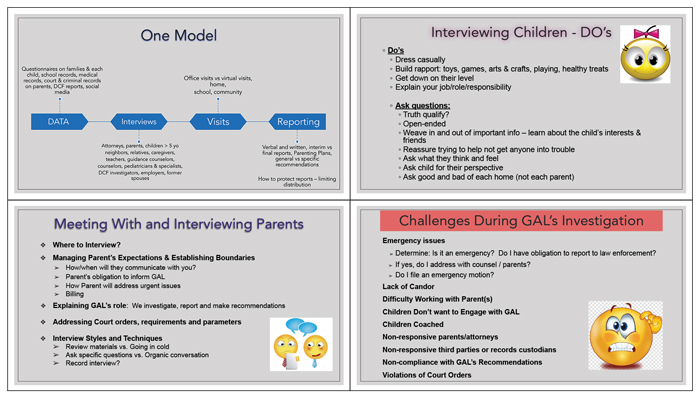Canakaris Inn of Court Presents Guardian Ad Litem Training
The Bencher—May/June 2022
By Nicholas J. Fiorentino, Esquire
 In December 2021, members of the Canakaris American Inn of Court in the Sixth Judicial Circuit of Florida, which encompasses Pinellas and Pasco counties, conducted a training for new guardian ad litems and an update for existing guardian ad litems. The training was a culmination of months of work and planning by several members of the Inn. It was brought on by the need for new attorneys to begin serving in these roles due to increased appointments, as well as to provide updated tools to current guardians so they are better equipped to confront new challenges. The training was held virtually with approximately 68 attorneys and 10 judges.
In December 2021, members of the Canakaris American Inn of Court in the Sixth Judicial Circuit of Florida, which encompasses Pinellas and Pasco counties, conducted a training for new guardian ad litems and an update for existing guardian ad litems. The training was a culmination of months of work and planning by several members of the Inn. It was brought on by the need for new attorneys to begin serving in these roles due to increased appointments, as well as to provide updated tools to current guardians so they are better equipped to confront new challenges. The training was held virtually with approximately 68 attorneys and 10 judges.
The training was offered free of charge to any attorney or mental health professional. The Inn asked attendees to contribute to one of the local legal aid organizations, ultimately donating $2,000 to assist in providing legal resources to community residents who cannot afford them.
Guardians in family law cases are authorized under Florida Statute 61.402, which allows any member of the Florida Bar to serve in this capacity. Florida statutes authorize guardians to “act as next friend of the child, investigator, or evaluator, not as attorney or advocate but shall act in the child’s best interest.” Guardians may investigate the allegations of the pleadings affecting the child and may interview the child, witnesses, or any other person having information concerning the welfare of the child. It is often said that the guardian is the “eyes and ears of the court.” Once guardians complete their investigation, they submit a final report to the court with their conclusions regarding the best interests of the child.
To assist those interested in being a new guardian, the training was broken up into several sections. The first training, which was taught by experienced guardians and Inn members, covered how to start a new guardian ad litem case, including the initial appointment of a guardian, retainer aspects, initial parent contact, best case management practices within the guardian’s office environment, potential conflict checks, and effective communication. The instructors also discussed the importance of knowing who to reach out to as a mentor for help with any issues.
The second training, which was the bulk of the training, focused on interviewing and investigating. This training taught how to perform an effective investigation and know the resources available to guardians. The instructors focused on tips and tricks for interviewing, identifying domestic violence and potential mental health issues, being cognizant of the time spent with each parent, how to work with resist-and-refuse situations, working with special needs children, handling evidence issues with recording statements, dealing with parents who lie, and how to request psychological and substance abuse evaluations. This was an informative refresher for seasoned guardians and gave the judges in attendance insight into how much work the guardians put into their reports.
 The final training focused on case management. There have been a number of hot topic issues for guardians in recent years; the focus of this section was to help guardians learn how to work with these issues when they arise but also how to prevent them. Topics included how to get paid as a guardian, whether to present a final report in written or oral form, how to file a motion as a guardian, defending oneself at depositions and in cross-examination, when to hire an attorney for oneself, testifying at hearings, and defending oneself at hearings where one side is trying to remove the guardian. One potential effective support is to have a “buddy system,” in which experienced attorneys assist in representing guardians pro bono when the need for representation arises.
The final training focused on case management. There have been a number of hot topic issues for guardians in recent years; the focus of this section was to help guardians learn how to work with these issues when they arise but also how to prevent them. Topics included how to get paid as a guardian, whether to present a final report in written or oral form, how to file a motion as a guardian, defending oneself at depositions and in cross-examination, when to hire an attorney for oneself, testifying at hearings, and defending oneself at hearings where one side is trying to remove the guardian. One potential effective support is to have a “buddy system,” in which experienced attorneys assist in representing guardians pro bono when the need for representation arises.
The training concluded with a judicial panel comprised of 10 current and retired judges. The judges fielded questions submitted by attendees in advance and during the live training. Topics included how to defend oneself during a hearing, how to file motions, how much weight the court gives to the guardian’s report, how to ask the court for help, and things the judges thought guardians could do better. There was also a presentation on legal issues related to recordings and wiretapping and to keeping the guardian’s address information confidential under Florida law.
Guardians were also provided materials on relevant case law and statutes, sample retainer agreements, sample orders, final report examples, and a list of community resources. To provide ongoing guardian support, a monthly guardian support group was set up, where guardians can discuss current issues they’re having and seek input. The group has become a great resource for guardians in the area so that no guardian has to deal with problems on their own.
The training was mutually beneficial to the attorneys and judges who attended. They were able to learn from each other about this important role that guardians and judges serve in to protect the best interests of children. Through the training, there was an exchange of information between the judges and guardians that gave each an appreciation for the roles and work that each puts into these types of cases and the constraints put on them by the applicable laws.
The American Inns of Court’s mission is to inspire the legal community to advance the rule of law by achieving the highest level of professionalism through example, education, and mentoring. Training sessions such as this are a direct tie-in to the Inn’s mission.
Through the training, guardians were encouraged to consider taking on guardian cases pro bono or for a reduced fee. Several attendees said they were already on the list to serve at a reduced fee or were willing to be added to the list.
While serving as a guardian can financially benefit a practice, it is also a new avenue to provide pro bono work to help support the judiciary in what is often one of the most difficult areas of the law—gathering the necessary information to make the best decision in the best interests of the child.
Nicholas J. Fiorentino, Esquire, is a partner at Ciarciaglino, Gell & Fiorentino, P.A. in Largo, Florida. He is a member of the Canakaris American Inn of Court in Clearwater, Florida.